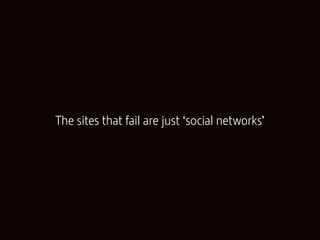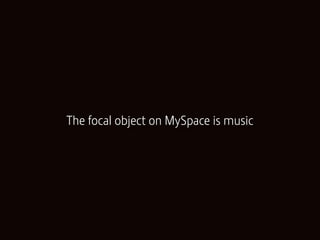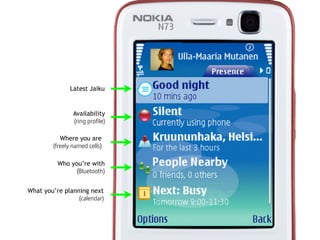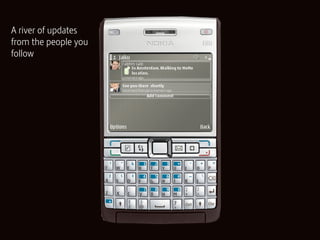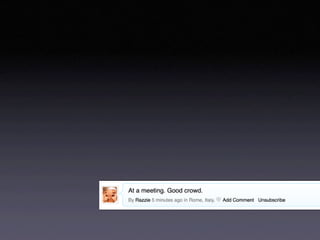Microblogging: Tiny social objects. On the future of participatory media
- 1. Microblogging Tiny social objects on the future of participatory media Jyri Engeström jyri.jaiku.com
- 2. Top 100 English Web sites on Alexa 1. Yahoo 31. Friendster 32. BBC Newsline Ticker 2. MSN 35. Internet Movie Database 3. Google 39. Go 4. YouTube 40. Craigslist 42. Flickr 5. MySpace 48. CNN 6. Baidu (Chinese search engine) 50. ImageShack 7. Windows Live 52. AOL 54. PhotoBucket 8. Orkut 59. Xanga (weblogs) 9. QQ (Chinese instant messenger) 67. LiveJournal 70. Geocities 10. Yahoo.co.jp (Japanese portal) 73. Adult Friendfinder 77. Apple 11. Wikipedia 78. RapidShare 13. Microsoft Corp. 79. ImageVenueHosting 14. EBay 80. Digg 15. Blogger 81. Alibaba (trade leads) 16. MegaUpload (file sharing) 84. Rediff (Indian portal) 19. Hi5 87. Googlesyndication 21. RapidShare 92. Skyblog 23. Amazon 94. Adobe 26. TheFaceBook 96. Starware 97. About 29. Fotolog 98. Sourcefourge 30. Passport.net An increasing number of the most popular services are built on user-generated content.
- 3. This talk has 3 parts
- 4. 1. The case for social objects 2. Five principles for building services around them 3. My take on the next wave
- 5. butterfly, butterfly fly in the sky butterfly, butterfly flies so high butterfly, butterfly lands on my thigh butterfly, butterfly motionlessly lies butterfly, butterfly gracefully dies
- 7. $580M
- 9. Is MySpace another butterfly?
- 11. The sites that fail are just ‘social networks’
- 13. The sites that work are built around social objects
- 14. Think about the object as the reason why people connect with each particular other and not someone else
- 15. Flickr did it to photos
- 17. Delicious did it to bookmarks
- 19. Amazon did it to books
- 21. The focal object on MySpace is music
- 23. How does one build a service around social objects?
- 24. 5 key principles
- 25. 1. Define your object
- 26. When we first launched Flickr, it was a Flash application that was mainly just a chat environment with real-time photo sharing. As we started adding features to the site itself, like pages that hosted the photos so that people could visit them at a unique URL, we had a lot more success with that. People responded to it, and the site began to grow. Eric Costello
- 28. Think about the objects on these services
- 29. 2. Define your verbs
- 31. Silent selling on Igglo
- 32. 3. Make the objects shareable
- 33. E-mailable permalinks http://www.flickr.com/photos/jyri/315809759/ http://youtube.com/watch?v=XhXvlLiVXCo http://en.wikipedia.org/wiki/Social_network Thumbnails and widgets Actual files
- 34. 4. Turn invitations into gifts
- 35. PayPal example
- 36. Skype example
- 37. 5. Charge the publishers not the spectators
- 40. Quick Checklist 1. What is your object? 2. What are your verbs? 3. How can people share the objects? 4. What is the gift in the invitation? 5. Are you charging the publishers or the spectators?
- 41. What will be the Next Big Thing in participatory media?
- 42. Can anything disrupt blogs?
- 43. Preconditions of a disruptive innovation: 1) Simpler or 2) Cheaper or 3) Frees from need to go to inconvenient place
- 46. ?
- 54. Preconditions of a disruptive innovation: 1) Simpler or 2) Cheaper or 3) Frees from need to go to inconvenient place
- 55. Jaikus = short posts to the people who follow you
- 56. Preconditions of a disruptive innovation: 1) Simpler or 2) Cheaper or 3) Frees from need to go to inconvenient place
- 58. “Can you talk?” “Where are you now?”
- 59. Latest Jaiku Availability (ring profile) Where you are (freely named cells) Who you’re with (Bluetooth) What you’re planning next (calendar)
- 60. Preconditions of a disruptive innovation: 1) Simpler or 2) Cheaper or 3) Frees from need to go to inconvenient place
- 61. “The Mass-Starbucksization of Nearly Everything”
- 62. Social objects “to go” Web communities Microcontent
- 63. A river of updates from the people you follow
- 64. A river of updates from the people you follow
- 65. A river of updates from the people you follow
- 66. A river of updates from the people you follow
- 67. A river of updates from the people you follow
- 68. A river of updates from the people you follow
- 69. A river of updates from the people you follow
- 70. A river of updates from the people you follow
- 71. Blog post 1 per week Photo 1 per day Jaiku 1 per hour
- 72. Occasional Continuous Beat Hum Particle Wave Videos Blog posts Photos Microblogging Presence
- 76. crisis
- 77. “The future’s here, it’s just not evenly distributed yet.” Is it free? Is it quick & easy? Is it cross-device & multi-channel? Is it everyday? Does it bring people closer together?
- 78. Last but not least an announcement











